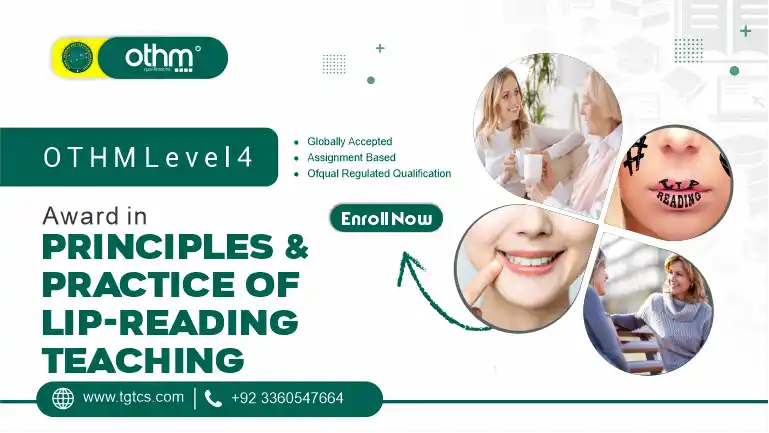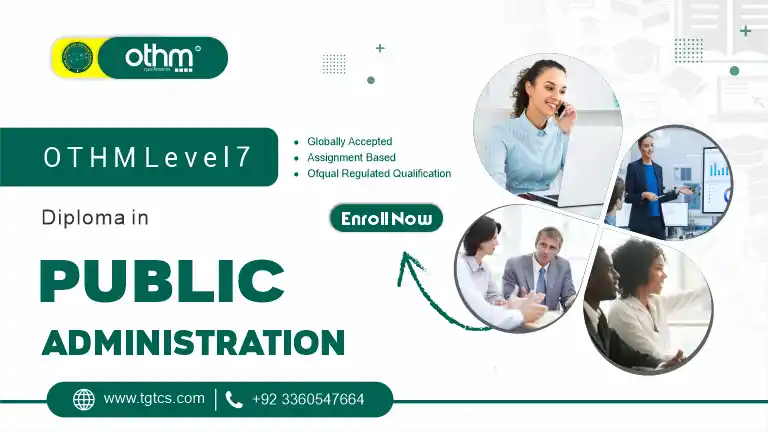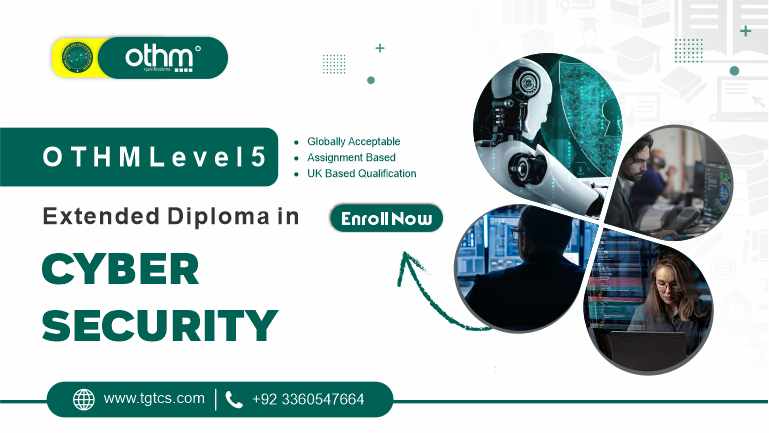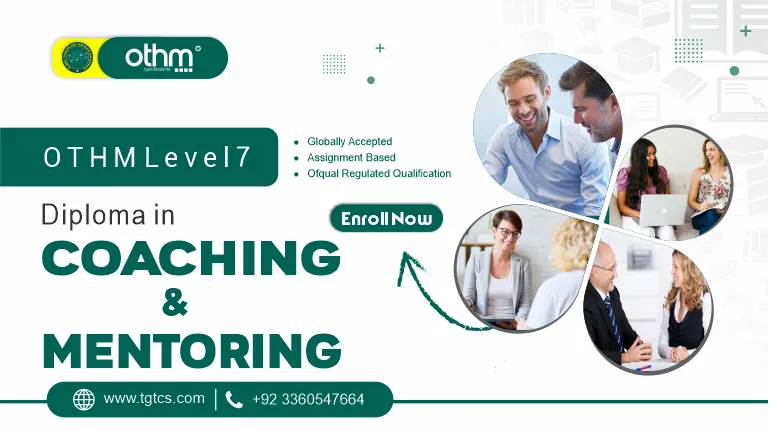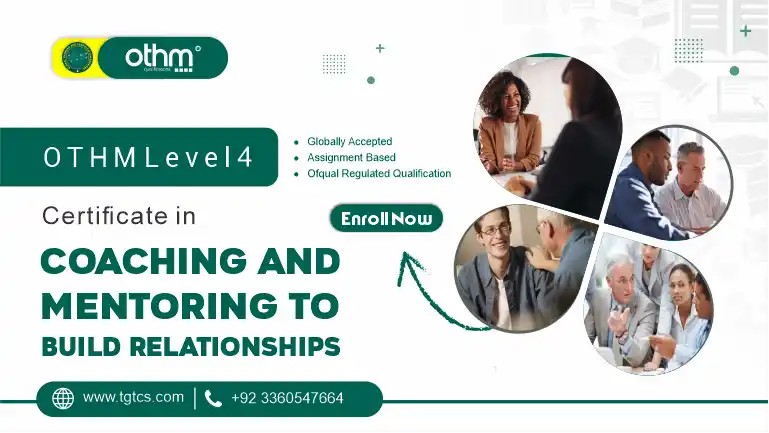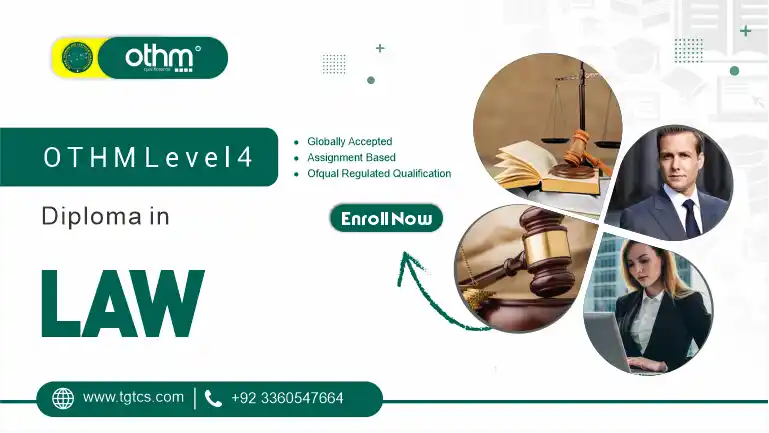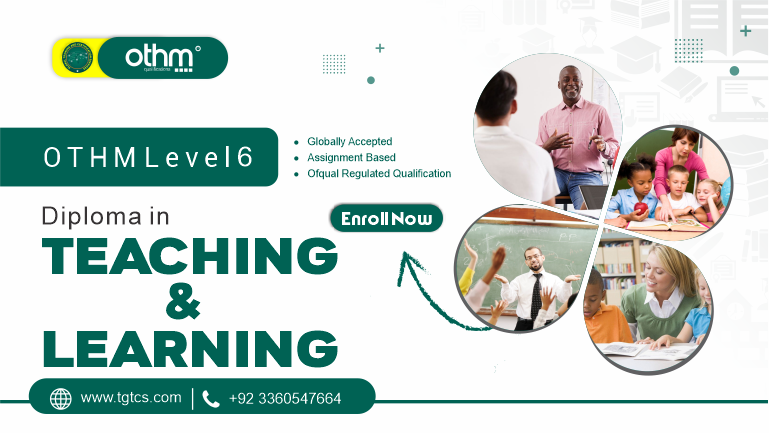OTHM Level 4 Award in Principles and Practice of Lip-reading Teaching
The OTHM Level 4 Award in Principles and Practice of Lip-reading Teaching is designed to provide a comprehensive understanding of lip-reading techniques, combining both theoretical foundations and hands-on strategies to help learners grasp the essential skills. Lip-reading is crucial for people with hearing impairments, enabling them to visually interpret speech and enhance their daily communication. This course will teach you the practical methods and strategies necessary to create an inclusive and supportive learning environment, ensuring your students feel empowered and confident.
The OTHM Level 4 Award in Principles and Practice of Lip-reading Teaching is your opportunity to advance your career, deepen your knowledge, and become an invaluable resource for those in need of lip-reading instruction. Let your passion for making a difference in the lives of others drive your professional journey, and gain the skills to help individuals with hearing difficulties navigate the world with confidence.
The OTHM Level 4 Award in Principles and Practice of Lip-reading Teaching is a specialized course designed to equip educators with the skills and techniques necessary for teaching lip-reading. Lip-reading is an essential skill for individuals with hearing loss, as it enables them to understand speech by visually interpreting the movements of a speaker’s mouth.
By completing the OTHM Level 4 Award in Principles and Practice of Lip-reading Teaching, you will be equipped with the expertise to overcome communication barriers and help individuals with hearing loss improve their interactions with others. Whether you’re an educator, support worker, or simply someone dedicated to making a positive difference, this qualification provides the tools to help you create a significant impact in the lives of those with hearing impairments. The OTHM Level 4 Award in Principles and Practice of Lip-reading Teaching covers a variety of key aspects, including the theoretical principles behind lip-reading, practical teaching methods, and how to create an inclusive learning environment for people with hearing difficulties.
The OTHM Level 4 Award in Principles and Practice of Lip-reading Teaching is an exceptional qualification for those who are passionate about supporting individuals with hearing loss. By gaining the skills and knowledge to teach lip-reading, you’ll be equipped to help others overcome communication barriers and improve their daily interactions. Whether you’re an educator, support worker, or someone looking to make a difference, this course offers the tools you need to create positive change in the lives of people with hearing impairments.
The Global Training and Certification Services (TGTCS) is Offering this qualification is Association with ICTQual UK
The OTHM Level 4 Award in Principles and Practice of Lip-reading Teaching is a specialized course designed for individuals interested in teaching lip-reading to those with hearing impairments. This accredited qualification provides essential skills and knowledge, including the history and principles of lip-reading, effective teaching strategies, and the psychological and social aspects of supporting learners.
The course is ideal for aspiring lip-reading instructors, current educators, and professionals in the hearing loss field. By completing this course, participants gain expertise in a niche area, enhancing their career prospects and ability to make a positive impact on individuals with hearing loss.
The OTHM Level 4 Award in Principles and Practice of Lip-reading Teaching offers several valuable benefits for individuals looking to enhance their skills and career in teaching lip-reading to those with hearing impairments. Here are the key benefits of completing this course:
1. Accredited Qualification
This course is accredited, providing a recognized qualification that boosts your professional credibility and opens up career opportunities in the field of education, support services, and hearing loss care.
2. Specialized Knowledge and Expertise
Gain specialized knowledge in lip-reading teaching techniques, allowing you to become an expert in this niche field. The skills acquired can help you offer effective, targeted support to individuals with hearing impairments.
3. Enhanced Career Prospects
With increasing demand for skilled professionals in the hearing loss and education sectors, this qualification can set you apart in the job market and improve your chances of career advancement.
4. Flexibility in Learning
Many providers offer flexible learning options, such as online modules and part-time study, which makes it easier to balance work, life, and education.
5. Personal Fulfillment
Teaching lip-reading provides an opportunity to make a meaningful difference in the lives of individuals with hearing loss. The course equips you with the tools to help others improve communication, confidence, and quality of life.
6. Practical Application
The course includes practical teaching strategies, enabling you to apply your learning directly in real-world scenarios. You’ll leave with the confidence to design and deliver effective lip-reading lessons.
7. Increased Employability
Whether you’re a teacher, social worker, or healthcare professional, this qualification enhances your skill set, making you more versatile and employable in various fields related to education and hearing loss support.
Mandatory Unit
The OTHM Level 4 Award in Principles and Practice of Lip-reading Teaching qualification consists of 1 mandatory unit, 12 credits, 100 hours Total Qualification Time (TQT) and the recommended Guided Learning Hours (GLH) for this qualification is a minimum of 48 hours.
- Principles and Practice of Lip-reading Teaching (12 Credits)
The OTHM Level 4 Award in Principles and Practice of Lip-reading Teaching is designed to equip learners with the knowledge and skills needed to effectively teach lip-reading to individuals with hearing impairments. Upon completion of the course, learners will achieve the following learning outcomes:
1. Understand the Principles of Lip-reading
- Demonstrate a comprehensive understanding of the history, theory, and principles behind lip-reading as a communication tool for people with hearing impairments.
2. Develop Effective Lip-reading Teaching Techniques
- Apply a variety of techniques and strategies to teach lip-reading, tailored to meet the needs of students at different levels of ability.
- Design and deliver practical lip-reading lessons that engage students and enhance their learning experience.
3. Assess Learners’ Needs and Abilities
- Assess the individual needs and abilities of students, adapting teaching methods to ensure an inclusive and effective learning environment for people with hearing loss.
4. Create and Implement Lesson Plans
- Develop structured lesson plans that focus on specific lip-reading skills, incorporating a range of resources and activities that aid in the learning process.
5. Understand the Psychological and Social Aspects of Lip-reading
- Recognize the psychological and social challenges faced by people with hearing impairments and how to create a supportive and empathetic learning environment.
- Foster confidence and self-esteem in learners, encouraging active participation and progress in lip-reading skills.
6. Evaluate and Reflect on Teaching Practice
- Reflect critically on your teaching practices, assessing the effectiveness of different methods and making improvements based on learner feedback and performance.
7. Demonstrate Professionalism and Ethical Practice
- Exhibit professional and ethical behavior when teaching and supporting learners, ensuring a safe, respectful, and inclusive learning environment.
8. Implement Strategies for Ongoing Learner Support
- Provide ongoing support to students outside of lessons, offering guidance and resources to help them continue developing their lip-reading skills beyond the classroom.
The OTHM Level 4 Award in Principles and Practice of Lip-reading Teaching is an ideal course for individuals who are passionate about supporting people with hearing impairments and wish to specialize in lip-reading instruction. The course is designed for:
- Current Educators: Teachers or instructors who wish to expand their expertise in teaching individuals with hearing difficulties, particularly those interested in adding lip-reading to their skill set to better support students with hearing loss.
- Support Workers and Caregivers: Individuals already working in support roles, such as caregivers, social workers, or healthcare assistants, who want to enhance their ability to help people with hearing impairments communicate effectively.
- Speech and Language Therapy Professionals: Those working in speech and language therapy who wish to specialize in providing lip-reading skills to clients with hearing loss, helping them improve their communication abilities.
- Community Volunteers and Advocacy Workers: People involved in organizations or charities that support individuals with hearing impairments, seeking to gain the necessary skills to teach lip-reading and assist in improving the quality of life for those with hearing difficulties.
- Individuals with a Passion for Helping People with Hearing Loss: Anyone who is eager to make a difference in the lives of people with hearing impairments, whether or not they have a background in education, healthcare, or social services, but who has a genuine interest in teaching and helping others.
The OTHM Level 4 Award in Principles and Practice of Lip-reading Teaching is perfect for learners who are empathetic, patient, and motivated by the desire to improve communication and quality of life for individuals with hearing loss. Whether you’re looking to advance your existing career, transition into a new field, or gain more specialized knowledge, this course offers the foundation to make a lasting difference in the lives of others.
Upon completing the OTHM Level 4 Award in Principles and Practice of Lip-reading Teaching, there are multiple exciting progression opportunities that can enhance both your career and your impact on the lives of individuals with hearing impairments. This qualification provides a strong foundation for further education and professional development in the field of hearing support and teaching.
1. Further Specialization in Hearing Impairment Education
You can progress into more specialized courses or certifications related to hearing loss and communication support, such as Speech Therapy, Hearing Impairment Support, or Assistive Technology for the Deaf and Hard of Hearing. These qualifications will allow you to expand your expertise and work with more specific groups within the hearing-impaired community.
2. Advanced Teaching and Educator Roles
As an experienced lip-reading instructor, you may wish to further your teaching career by advancing to more senior educator roles. With additional training or qualifications, you could become a Lead Instructor or Curriculum Developer for lip-reading programs, responsible for training other teachers and developing course content for educational institutions or organizations specializing in hearing loss.
3. Professional Development and Research Opportunities
After obtaining your OTHM Level 4 Award in Principles and Practice of Lip-reading Teaching, you could pursue research opportunities in the field of hearing impairment and education. This could involve contributing to the development of new teaching methods, materials, or technologies that can assist in lip-reading instruction. Engaging in research can position you as a thought leader in the field and open up opportunities for writing academic papers or presenting at professional conferences.
4. Career Growth in Social Services and Support Work
The OTHM Level 4 Award in Principles and Practice of Lip-reading Teaching also opens doors to more advanced roles in social services, particularly within departments that support people with hearing impairments or other disabilities. You may choose to become a Support Worker or Hearing Loss Specialist within healthcare or community services, where your skills in lip-reading instruction will be an asset in improving communication for those in need.
5. Transition to Accredited Teaching Roles
You may also decide to continue your journey towards becoming an accredited Teacher of the Deaf or Special Educational Needs Coordinator (SENCO), which would allow you to work in schools and educational settings with children and adults who have hearing loss or other communication barriers.
The OTHM Level 4 Award in Principles and Practice of Lip-reading Teaching provides you with an essential stepping stone towards a rewarding career in hearing impairment education and support, while also offering a wide array of progression routes for both professional growth and further study.
Course Overview
Course Level
Level 4
Course Units
1 mandatory Units
TQT
100 hours
GLH
48 hours
Duration
4 to 6 Months
